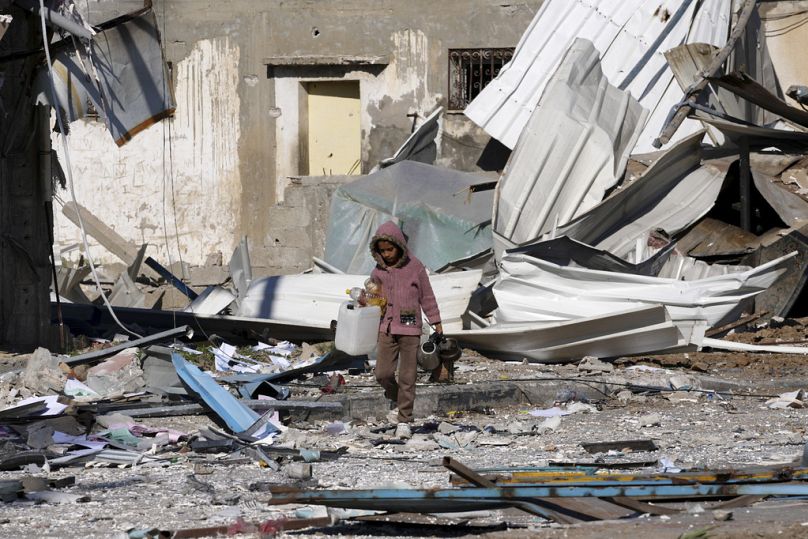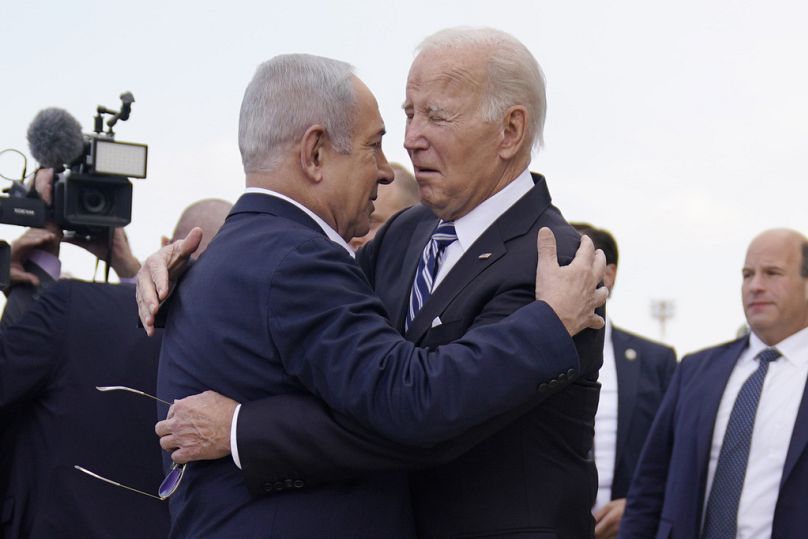The latest updates from the ongoing conflict.
UN: Women and children main victims of Israel-Hamas war with 16,000 killed
Women and children are the main victims in the Israel-Hamas war, with some 16,000 killed and an estimated two mothers losing their lives every hour since Hamas’ surprise attack on Israel, the United Nations agency promoting gender equality has said.
 ADVERTISEMENT
ADVERTISEMENT
 ADVERTISEMENT
ADVERTISEMENT
As a result of the more than 100-day conflict, UN Women added, at least 3,000 women may have become widows and heads of households and at least 10,000 children may have lost their fathers.
The agency pointed to gender inequality and the burden on women fleeing the fighting with children and being displaced again and again. Of the territory’s 2.3 million population, it said, 1.9 million are displaced and “close to one million are women and girls” seeking shelter and safety.
UN Women’s executive director, Sima Bahous, said this is “a cruel inversion” of fighting during the 15 years before the Hamas attack on 7 October. Previously, she said, 67% of all civilians killed in Gaza and the West Bank were men and less than 14% were women.
She echoed UN Secretary-General Antonio Guterres’ calls for a humanitarian cease-fire and the immediate release of all hostages taken captive by Hamas.
“However much we mourn the situation of the women and girls of Gaza today, we will mourn further tomorrow without unrestricted humanitarian assistance and an end to the destruction and killing,” Bahous said in a statement accompanying the UN’s report.
“These women and girls are deprived of safety, medicine, health care, and shelter. They face imminent starvation and famine. Most of all they are deprived of hope and justice,” she said.
The health ministry in Hamas-run Gaza says nearly 25,000 Palestinians have been killed in the conflict, 70% of them women and children. The United Nations says more than a half million people in Gaza - a quarter of the population - are starving.
Reported Israeli airstrike on Syria destroys building used by Iranian paramilitary officials
An Israeli strike on the Syrian capital, Damascus, destroyed on Saturday a building used by Iranian paramilitary Revolutionary Guard killing and wounding 10 people, state media outlets and an official with an Iran-backed group said.
An opposition war monitor, the Syrian Observatory for Human Rights, said at least five people were killed in the missile attack that struck when officials from Iran-backed groups were holding a meeting.
State-TV reported that the “Israeli aggression” targeted a residential building in the tightly guarded western Damascus neighbourhood of Mazzeh, home to several diplomatic missions, including the Lebanese and Iranian embassies.
An official with an Iran-backed group in the Middle East told The Associated Press that the building was used by Revolutionary Guard officials, adding that the “Israeli missiles” destroyed the whole building and that 10 were either killed or wounded in the attack.
The strike came amid widening tensions in the region and the Israeli offensive on Gaza that has killed thousands.
Last month, an Israeli airstrike on a suburb of Damascus killed Iranian general Seyed Razi Mousavi, a longtime adviser of the Iranian paramilitary Revolutionary Guard in Syria. Israel has also targeted Palestinian and Lebanese operatives in Syria over the past years.
Israel has carried out hundreds of strikes on targets inside government-controlled parts of war-torn Syria in recent years.
Israel rarely acknowledges its actions in Syria, but it has said that it targets bases of Iran-allied militant groups, such as Lebanon’s Hezbollah, which has sent thousands of fighters to support Syrian President Bashar Assad’s forces.
Biden and Netanyahu speak at last - but their visions for ending conflict still clash
President Joe Biden and Israeli Prime Minister Benjamin Netanyahu finally spoke late on Friday after a glaring, nearly four-week gap in direct communication during which fundamental differences have come into focus over a possible pathway to Palestinian statehood once the fighting in Gaza ends.
Biden and his top aides have all but smothered Netanyahu with robust support, even in the face of global condemnation over the mounting civilian death toll and humanitarian suffering in Gaza as the Israelis have carried out military operations.
However, the leaders' relationship has increasingly shown signs of strain as Netanyahu has repeatedly rebuffed Biden's calls for Palestinian sovereignty, gumming up what the US president believes is the key to unlocking a durable peace in the Middle East — the oft-cited, elusive two-state solution.
Neither side shows signs of budging.
Friday's phone call came one day after Netanyahu said that he has told US officials in plain terms that he will not support a Palestinian state as part of any postwar plan. Biden, for his part, in Friday's call reaffirmed his commitment to work toward helping the Palestinians move toward statehood.
“As we’re talking about post-conflict Gaza... you can’t do that without also talking about the aspirations of the Palestinian people and what that needs to look like for them,” National Security Council spokesman John Kirby said.
The leaders spoke frequently in the first weeks of the war, but the regular cadence of calls between Biden and Netanyahu, who have had a hot-and-cold relationship for over three decades, has slowed considerably. Their 30-to 40-minute call on Friday was their first conversation since 23 December.













